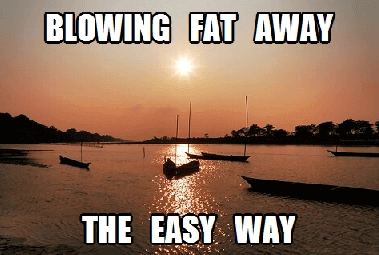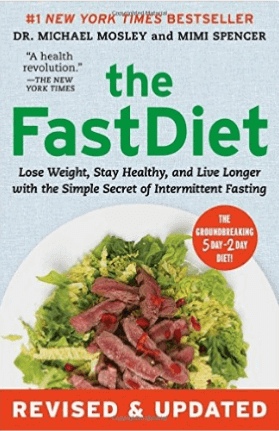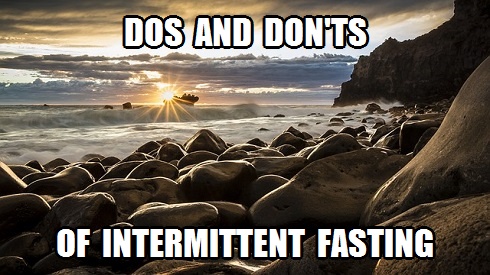Can You Have Diet Drinks on Intermittent Fasting
How Long Can I Do Intermittent Fasting, Why Fast For That Long, The Dos & Don'ts of Intermittent Fasting
By Dr Joe
On this page, you'll get to know everything about how long to do intermittent fasting for in terms of each fasting episode (and why) as well as how many weeks or months an intermittent fasting program should last.
As a bonus, you also get to know about the dos and don'ts of intermittent fasting. Very important!

You can do intermittent fasting for as long as you want to. Intermittent fasting is a fairly harmless life hack, that's packed with immense benefits.
It all depends on what you are trying to achieve with intermittent fasting. That would determine how long you can do intermittent fasting for.
However, if you want a specific figure to guide you, I will tell you that a reasonable intermittent fasting program should last between 6 weeks to 6 months. Why is this?
Well, Read on and you will understand why.
In answering this question though; it's never clear to me what the intention behind the question is.
Would you like to know:
- How long each fasting episode should last for?
- Or how long an intermittent fasting program should last for?
How about I answer both questions, huh. That way, we have all our bases covered. Sounds like a good idea?
Okay. Good. Let's do it then.
How long each intermittent fasting episode should last for?
Each fasting episode should last for a minimum of 16 hours to get the benefits of intermittent fasting. Hence, the 16/8 intermittent fasting is the most popular.
The reason is that you want to use up your immediate energy stores, so you can start drawing on your energy reserves.
That's how you lose fat with intermittent fasting. You have to enable your metabolism to start burning the stored fat. That fat you hate. That fat that is dangerous to your health, especially the visceral fat.
You've got to start burning that stored fat. Otherwise that fasting episode will become an exercise in futility.
Guess, how long it takes for your body to use up the immediate energy reserves? The glycogen in your liver, that is. It takes about 10 – 12 hours to burn your immediate energy stores up before you can start burning the fat you saved up for that "rainy day" that never comes.
Instead, you add more to the fat stores. That's what makes us fat, because we never get to use up those fat stores.
So, as you can see, if you fast for 16 hours, and it takes you 10 – 12 hours to use up all of the immediate energy stores, you are in effect going to draw on your fat reserves for only 4 – 6 hours out of the 16 hours. Hope you can do the math.
If you want to achieve more, then your strategy will be to increase that interval period where you need to use up those fat reserves. Hence, a 16-hour fast period is the bare minimum. If you can extend that fast period longer, you begin to ramp up the benefits of intermittent fasting even more.
==> How about 20 hours fast. That will give you 8 – 10 hours fat burn time.
==> 24 hours fasting will give you 12 – 14 hours fat burning interval. Cool!
==> Are you strong enough to fast for 36 hours? If you are, then you get 24 – 26 hours of fat burning. OMG, now we are talking some serious fat burning.
You get the picture.
A reality check but do not be scared
Now here's a reality check. A 36-hour fast will not come easy for most people. That much I know. But you don't have to set your sight that high. At least not when you're a rookie anyway.
If you are new to intermittent fasting, go for the bare minimum of 16 hours first. That's the 16/8 intermittent fasting protocol. The 16/8 intermittent fasting protocol gives you an 8-hour eating window which is not that hard to accomplish.
Once you conquer that, then you can gradually increase the fasting interval by adding one extra hour each time. There are people who will fast for 3 days or longer. Don't be jealous of them. Do what you are comfortable with, okay.
My longest fast was 36 hours but now I only do 24 hours on each fasting episode and I am happy with that. Serves my needs. Which leads me to:
How long should an intermittent fasting program last for?
This wholly depends on your objective.
Your intermittent fasting program can last for a month, 2 months, 6 months, 1 year or you can have a fasting program that lasts forever as part of your on-going eating plan.
There are no set rules. Once you get into it, you will see what I mean. In fact, you may start to enjoy intermittent fasting actually. Hard to believe, I know. But you do. I do enjoy it. Okay, may be I'm weird, but hey…
I know that some people may want to know how long to do intermittent fasting for to see weight loss results. Then again, that would vary from person to person. In particular, how you manage your diet during the intermittent fasting eating window will play a huge role in your intermittent fasting results.
What you eat matters a lot during the eating window.
On the whole though, you will start to see intermittent fasting results in 2 weeks, if you fast for 3 days a week. You will get better weight loss results with intermittent fasting, if you add a workout to the plan.
What's your intermittent fasting objective?
You may start intermittent fasting because you want to lose some weight, let say 11 lbs. Choose a plan and go with it until you hit that target of 11 lbs.
Or you may want to lose a certain percentage of body fat.
Get yourself an electronic body fat estimator and latch on to a plan and off you go. Monitor what you are doing, to see if you have lost the percentage of body fat you plan to lose.
If it takes you 8 weeks to lose 11 lbs, then it's up to you if you wish to continue or not.
It is difficult for anyone to prescribe how long you should or can do intermittent fasting for. Because I, for instance, do not know you personally. Only if someone is coaching you on a one-to-one basis can they tell you how long you should do intermittent fasting for.
Intermittent Fasting good for Reversing Insulin Resistance and Muscle Building
You may start intermittent fasting because you want to reverse your insulin resistance. That objective might take you a little longer to achieve, so you could be fasting intermittently for say 5 – 6 months.
If your objective is to build muscle with intermittent fasting, then it may take you as long as 4 – 6 months or even longer. With muscle building, you will want to consider adding a workout regime to the fasting.
You also should consider doing your workout routine which must include resistance training towards the last 2 hours of the fasting window to accelerate the process.
In essence, I am saying the workout should be the last activity you do before you resume eating. That has been shown to be very effective.
You can tweak your fasting schedule for weight maintenance
Here is the thing.
Even if you have hit your goal, you shouldn't rest on your laurels just yet. How about considering maintenance intermittent fasting protocol to keep your goals sustained?
Let's say you were doing alternate day fasting where you may have fasted for 4 or 5 days a week and you have now hit your target weight loss objective. How about you reduce that to fasting 2 days a week for maintenance.
How about you adopt the 5:2 intermittent fasting method where you cut down on your calories requirement to 20 or 30% for 2 days a week. Feasible? I sure think so.
How about you start skipping breakfast say 5 days a week and have your first meal of the day at 1pm and have one more meal at 8pm. Nothing else to eat again until 1pm the following day. Feasible? Definitely.
You can adopt any method that suits your professional and social life and tweak it to fit your lifestyle and carry on doing intermittent fasting for as long as possible and reap the benefits for life.
I personally always skip breakfast and I don't have my first meal until about 1.30pm, if I am lucky. Sometimes 3pm on a busy day at work. Then my main meal of the day is usually around 8pm. Lately I go straight for the 24-hour fast. Even better. Works for me!
The book below explains the 5:2 fasting plan. Get a copy from Amazon.com or over here on Amazon.co.uk

How often can you do intermittent fasting?
This also up to you. There are no set rules on how often you can do intermittent fasting for. You can have an initial phase where you hit your goals after a couple of weeks. Then have a break for say 3 months and eat the routine way for the 3 months.
Then, re-start intermittent fasting again for another 3 months, have a break for 3 months and do the same thing again.
You can use a 2 month ON, 2 months OFF model, 4 months ON, 4 months OFF – (Switch ON/OFF). Do this repeatedly. No rigid rules about how often you can fast intermittently.
If the question is about how often to fast during the week, it would depend on the IF plan you adopt. The 5:2 requires you to fast 2 days a week (Monday and Thursday, for instance). Alternate day fasting is as the name suggests, every other day.
The 2 days you fast in the 5:2 plan are not actually a total fast. It only requires you to hold back on your calories to 500 Calories for those 2 days.
The true 24-hour fast may require you to do this twice or three times a week, if you can handle that frequency.
If you can't, even one day a week is okay until you get comfortable with it and you can then try 2 days a week.
Even one day a week is certainly better than what you are currently doing. It will still work. It's just going to take longer.
So, if you want to know how many weeks to do intermittent fasting, all I can say is there's no 'one size fits all' approach.
You can fast for 4 weeks, 8 weeks, 12 weeks, 16 weeks, 26 weeks, 52 weeks (1 year), 2 years, 4 years, 10 years, fast intermittently for life. You can also use the switch ON/OFF model too in terms of frequency. The choice is yours and it should be based on what you want to achieve.
What are the do's and don'ts of intermittent fasting?
When it comes to the do's and don'ts of intermittent fasting, the rules are fairly flexible. But achieving your goal does require you to do certain things that will improve your chances of getting to the promised land.
Use these do's and don'ts as tips for intermittent fasting as well.
Okay here are some of the do's of intermittent fasting:
1. Do your exercise or workout close to your feeding time. This has been shown to be very effective producing really good results especially for people who want to build muscle. Some people use BCAAs (Branched Chain Amino Acids) or Bang energy drinks to break their fast.
2. The follow up to that is that you should have your main meal after your workout or exercise routine. You may have another meal afterwards. But must be within the eating window of the intermittent fasting plan.
3. You can take bcaa supplement just before your exercise. It's not going to hurt your results. If anything, it is actually a good thing as bcaas contain essential amino acids. BCAAs help with muscle building and muscle bulk maintenance. See article on the advantages of using BCAAs.
4. On fast days, one way of coping is to have warm beverages. But absolutely calorie-free sweeteners only are allowed in your beverage. This is particularly important in the evenings. The time you will be most tempted to cheat.
5. For those on alternate fasting day plan, ensure you slash your calories to 500 Calories, maybe 600 Calories if you are a man. Having a good dose of leafy greens can give you a feeling of fullness. Whilst controlling your calorie intake at the same time.
6. Having proteins on fast days can also be a good idea. White meat like Turkey, Chicken, Goose or Broad beans for vegetarians can let you hold up the fast more effectively.
7. Reconstitute your macronutrients on your workout days and rest days. Carbs should constitute 60% of your meal on days you exercise and have high fat diet on rest days. Maintain the protein content the same on all days.

And some of the don'ts of intermittent fasting:
- Do not do your exercises in the evenings on fast days. Exercise has been shown in a lot of people to trigger hunger. Meaning you might be tempted to eat when you shouldn't.
2. Do not add a lot of milk to your coffee. Only use half or teaspoon of milk when having tea or coffee. Milk does contain lactose which is sugar. This could derail the plan. Only use a small amount.
3. Use your fasting period to do stuff. Don't sit idle. Getting busy will stop you thinking about food.
4. Don't keep changing your feeding window if you are on the plan that allows food at certain times. If your eating window is between 12 Noon and 8pm, try and maintain that consistency every time. It's all about teaching your body to adapt to a new way of eating and fasting.
5. Do not go to social events where the place will be awash with food on your fast days. The temptation of having so many food choices and so much food around might be too much for you to resist.
6. On your feed days or eating window as the case may be, you should exercise caution in how much food you consume. There's no need to stuff your face with so much food in an attempt to compensate for the fast period.
It is not a feast or famine ethos and you should refrain from seeing it as such. Eat sensibly!
Above all, be resilient. It's not as hard as it appears. Start small and build up.
If you like your coffee, you may be also interested in the answer to the question: does coffee break a fast?
What do you think of what you have read on this page? Got something to add? Got a compliment?
Share your experience with me and other readers by leaving a comment below. Say something. Don't be shy!
Suggested further reading:
How to Avoid Complicated Diet Rules and Prevent Rebound Weight GAIN
Save
Save
Save
Save

Can You Have Diet Drinks on Intermittent Fasting
Source: https://thedrjoe.com/long-can-i-intermittent-fasting/